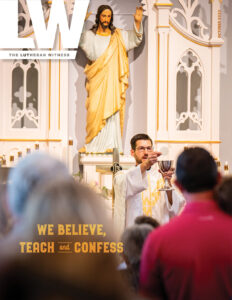Last February, we discussed Lutheran doctrine as it related to other world religions. I introduced that issue with a couple of analogies some people use to describe religion: as blind men feeling an elephant or that all religions are merely different paths up the same mountain. The rest of the issue demonstrated the inadequacy of these analogies.
Critics of Christianity — in fact, even many Christians — use the same analogies to describe the various denominations of Christianity, simply different paths up the same mountain or different aspects of the same elephant. Even a favorite author of mine, C.S. Lewis, taught that there exists a set of core teachings of the Christian church to which most church bodies adhere — mere Christianity if you will. He portrayed this mere Christianity as the “hallway” of Christianity while the various confessions or denominations are the rooms in the house.
But is this true? Do all Christian churches essentially teach the same thing or do they all hold to a set of core central teachings? Is Lutheran simply the flavor of Christianity that you prefer to put in your religious ice cream cone?
As with February, the communications team here at the LCMS has worked up for you a study of the major Christian denominations, their histories, confessional documents and what we Lutherans confess in light of those teachings. Stacey Egger, Cheryl Magness and Megan Mertz put a lot of work into this issue. We do not include bylines in these issues because we want you to focus on the content. But I must say, any brilliant writing in this issue belongs entirely to them.
Before closing, let me offer a few clarifying statements. The statement — as we have it listed at the bottom of this page — that the purpose of The Lutheran Witness is to “show how the Evangelical Lutheran Church is the true Christian church on earth” does not mean there are no Christians outside the Lutheran church, much less the LCMS. It does mean, however, that if you want to know where the Word of God is rightly taught, you should look to the doctrine of the Evangelical Lutheran church, not a particular denomination, but the teaching of Scripture and explanations in the Book of Concord. We do not say this out of pride but the sincere belief that Lutheran doctrine and biblical doctrine are the same.
Secondly, we are also not saying that those who hold to one or more heterodox teachings will necessarily suffer eternally in hell. Rather, working to understand God’s Word and avoid false teaching is a regular part of the Christian life, and the purpose of this issue — and this very magazine — is to help you learn more about what you believe as a Lutheran and why you believe it.
Boldly Lutheran,
Roy S. Askins
Managing Editor, The Lutheran Witness
Download or order a booklet adapted from the contents of this issue here.







